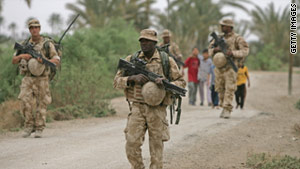By Tamara Alfred
Impunity Watch Reporter, Africa
On Friday, July 8, the United Nations’ refugee agency, UNHCR, put out an urgent plea for $136 million in international donations to help deal with the approximately 10 million people in Somalia, Ethiopia and Kenya who are at risk of starvation as the region faces the worst drought in 60 years.

Two consecutive poor rainy seasons over the past year have dried up pastoral areas in the Horn of Africa, where the drought is exacerbated by already sky-high food prices, restricted humanitarian access and conflict. Food is so scarce in Somalia that many will endure several weeks-long journeys through the desert just for the hope of nourishment at overcrowded Kenyan camps. During the journey, many have to brave often fatal attacks by packs of hyenas and armed bandits, said Alun McDonald, an Oxfam representative in Kenya.
“2011 has been the year of all crises, but I think that in Somalia we can find the worst humanitarian disaster of the year,” UN High Commissioner for Refugees Antonio Guterres said in a statement. “I have never seen…people coming in such desperate conditions.”
Somalis are pouring into the already full Dadaab refugee camp in Kenya. According to Bettina Schulte, Dadaab spokeswoman of the UNHCR, approximately 400,000 people are living in the camp, originally constructed to hold 90,000 people. In June alone, 55,000 Somalis entered Kenya and Ethiopia, with about 1,700 arriving each day. The flood of refugees still coming means that more than 60,000 Somalis are camped outside the actual refugee camp. According to Melissa Fleming, spokeswoman for the UNHCR, about 80% of the people are women and children.
A new refugee camp in Kobe, Ethiopia, opened just weeks ago to help address the growing number of refugees. Already it is nearing its 20,000 person capacity.
The UN refugee agency said the flood of Somalis could overwhelm the ability of humanitarian agencies to help them: “Humanitarian efforts to help newly arriving Somali refugees in southeast Ethiopia are at risk of being overwhelmed without a more rapid and robust international response to the drought and displacement crisis in the Horn of Africa,” said Fleming.
“Refugee children are dying and their mothers, reduced to walking skeletons, face the unbearable choice of which child to save first,” Guterres said.
The World Food Programme estimates that more than 10 million people are already in need of humanitarian aid, with the UN Children’s Fund estimating at least two million children are suffering from malnourishment.
For more information, please see:
Time – World’s Greatest Ongoing Humanitarian Disaster Reaches a Crisis Point – 13 July 2011
AllAfrica.com – Somalia: UN – Situation is ‘Worse Humanitarian Disaster’ – 11 July 2011
CNN – Refugee chief: ‘Heart is broken’ by hungry refugees fleeing Somalia – 8 July 2011


